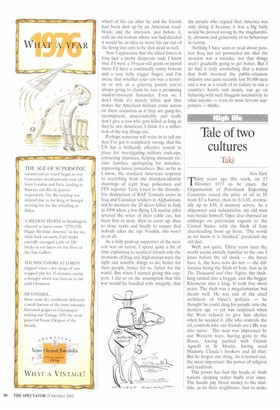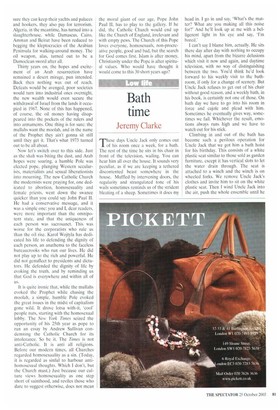Tale of two cultures
Taki
New York
Thirty years ago this week, on 17 October 1973 to be exact, the Organisation of Petroleum Exporting Countries raised the price of oil to $5 from $3 a barrel, then to $11.65, eventually up to $30, if memory serves. As a shipowner and industrialist, my old man was beside himself. Opec also imposed an embargo on petroleum exports to the United States, with the Shah of Iran cheerleading from up front. 'The world as we know it is finished,' predicted my old dad.
Well, not quite. Thirty years later the world seems awfully familiar to the one I knew before the oil shock — the haves have it, the have-nots do not — the difference being the Shah of Iran. Just as in The Thousand and One Nights, the shahking turned into a beggar, and the beggar Khomeini into a king. It took five short years. The shah was a megalomaniac but meant well. He was one of the chief architects of Opec's policies — he thought he could drag his people into the modern age — yet was surprised when the West refused to give him shelter when he needed it. (He who controls the oil, controls who our friends are.) He was also naive. The man was impressed by our Western ways, having gone to the Rosey, having partied with Gianni Agnelli in St Moritz, having used Madame Claude's hookers and all that. But he forgot one thing. As it turned out, the most important: the power of religion and tradition.
This power has had the heads of Arab nations sleeping rather badly ever since. The Saudis pay blood money to the mullahs, as do their neighbours. Just to make sure they can keep their yachts and palaces and hookers, they also pay for terrorism. Algeria, in the meantime, has turned into a slaughterhouse, while Damascus, Cairo, Amman and Beirut have been reduced to begging the kleptocracies of the Arabian Peninsula for walking-around money. The oil weapon, alas, turned out to be a Damoclean sword after all.
Thirty years on, the hopes and excitement of an Arab resurrection have remained a desert mirage, pun intended. Back then nothing was out of reach. Defeats would be avenged, poor societies would turn into industrial ones overnight, the new wealth would even secure the withdrawal of Israel from the lands it occupied in 1967. None of this has happened, of course, the oil money having disappeared into the pockets of the rulers and into armaments. One thing is for sure: the mullahs want the moolah, and in the name of the Prophet they ain't gonna sit still until they get it. That's what 1973 turned out to be all about.
Now let's switch over to this side. Just as the shah was biting the dust, and Arab hopes were soaring, a humble Pole was elected pope, plunging Western secularists, materialists and sexual liberationists into mourning. The new Catholic Church the modernists were praying for, one dedicated to abortion, homosexuality and female priests, went down the swanee quicker than you could say John Paul II. He had a conservative message, and it was a simple one: you and I. dear readers, were more important than the omnipotent state, and that the uniqueness of each person was sacrosanct. This was worse for the corporatists who rule us than the oil rise. Karol Wojtyla has dedicated his life to defending the dignity of each person, an anathema to the faceless bureaucrooks who run our lives. He did not play up to the rich and powerful. He did not genuflect to presidents and dictators. He defended the dignity of life by evoking the truth, and by reminding us that God is everywhere and within all of us.
It is quite ironic that, while the mullahs evoked the Prophet while chasing the moolah, a simple, humble Pole evoked the great issues in the midst of capitalism gone wild. It drove lotsa with-it, 'cool' people nuts, starting with the homosexual lobby. The New York Times seized the opportunity of his 25th year as pope to run an essay by Andrew Sullivan condemning the Catholic Church for its intolerance. So be it. The Times is not anti-Catholic. It is anti all religions. Before our modern times, all Churches regarded homosexuality as a sin. (Today, it is regarded as sinful to harbour antihomosexual thoughts. Which I don't, but the Church must.) Just because our culture views homosexuality as one step short of sainthood, and reviles those who dare to suggest otherwise, does not mean the moral giant of our age, Pope John Paul II, has to play to the gallery. If he did, the Catholic Church would end up like the Church of England, irrelevant and with empty pews. The Church of this Pope loves everyone, homosexuals, non-procreative people, good and bad, but the search for God comes first. Islam is after money, Christianity under the Pope is after spiritual values. Who would have thought it would come to this 30 short years ago?



































































































 Previous page
Previous page